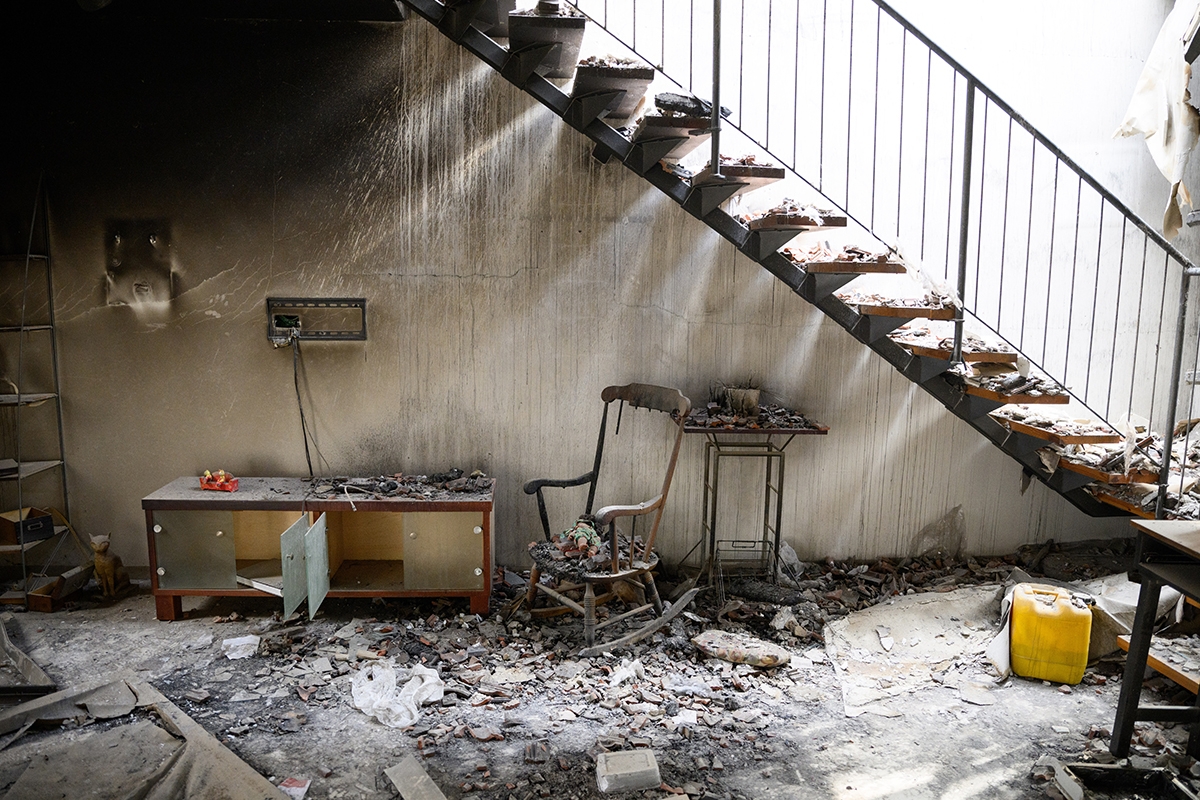Out of the ruins of Maayana and Noah Hershkovitz’ home, their final resting place in their beloved kibbutz of Be’eri, a symbol of Jewish survival rose from the rubble in one early picture following the October 7 attack — a lone menorah, almost upright. The menorah belonged to the grandfather of the three now orphaned Hershkovitz children, a Holocaust survivor and partisan fighter. Their grandmother Shoshana was also killed during the attack.
Two months later, the youngest of those three kids, Tamir Hershkovitz, 32, returned to the rubble to light that menorah and sing songs in his resonant mellifluous voice. He sang “Maoz Tzur” and “Al HaNisim.” And in a video shared on social media, you can hear Hershkovitz sing “I Believe” based on a poem by Shaul Tchernichovsky, a song that some have suggested should be Israel’s new national anthem. It’s a strong part of the Zionist labor movement, who were the founders of many of the kibbutzim attacked on October 7. The poem’s two opening stanza are translated as follows:
Rejoice, rejoice now in the dreams
I the dreamer am he who speaks
Rejoice, for I’ll have faith in mankind
For in mankind I believe.
For my soul still yearns for freedom
I’ve not sold it to a calf of gold
For I shall yet have faith in mankind
In its spirit great and bold
Dressed in a pressed button-up shirt, his gaunt face lit up by candlelight as the sun sets above him on the first night of Hanukkah, and flanked by the skeletal remains of his parents’ home, Hershkovitz makes for a haunting image as he sings these words. A phoenix rising from the ashes, the menorah stands proud among the rubble, shinning brightly, bearing witness to the words chanted in reverent, pristine Hebrew.
Tamir Hershkovitz, who lost his parents on October 7th, lighting the first candle of Hanukkah in the ruins of his house in kibbutz Beeri.
Surreal.
The song he sings would be a good choice for a national anthem…— Inbal Goshen (@GoshenInbal) December 10, 2023
The song, full of idealism and humanism, was written by Tchernichovsky, the beloved poet, writer and translator who has been immortalized on the new 50 shekel bill, when he was only 22 in 19th century Odessa. It starts with a declaration of faith in humanity, and is also about peace, freedom and socialist principles. Those who have pushed for it to be a new Israeli anthem say it paints a more idealized kind of Israel, one in which we believe in not just Jewish hope, but in every citizen of the state.
On the day the attack happened, Tamir’s parents were supposed to visit him in his home in Taoz, a moshav an hour away from Be’eri. But Hamas struck too early for them to make their way.
As a Hanukkah gift, an artist in Taoz gave the family a giant golden replica of the menorah, which Tamir and his older sisters Ella and Amit emotionally accepted, before they made their way to Be’eri for a candle lighting of the original menorah.
Asked by Ynet how he could sing such an optimistic song at the site of his family’s biggest tragedy, Hershkowvitz replied, “Once I sing, I’m happy. And now I’m happy.” He said that he chose to pay tribute to his parents with happiness, too.
Back in November, Gil Dickman, another relative of a person slaughtered on October 7, dedicated “I Believe” to his beloved aunt, Kinneret, in a special episode of the radio show Reshet Gimel called “Shir Preida,” or “Farewell Song,” in which relatives of those killed got to each dedicate a song to a beloved departed friend or family member.
Dickman talked about how they sang the song at Kinneret’s funeral. “She was an amazing woman and educator. She loved nothing more than to sing and travel. On her 60th birthday she printed 50 songs for everyone to sing with her,” he recounted and told the listeners that Kinneret’s daughter, Carmel Gat, and her daughter-in-law, Yarden Roman-Gat, had been both captured by Hamas.
It turns out that Yarden Roman-Gat was listening to the radio from Gaza that day, and that is how she found out her 3-year-old daughter, Geffen, who she last saw escaping captivity in the arms of her husband, Alon, had not been killed in the attack. She said that “I Believe” and Gil’s words that followed helped give her the strength to survive until her release last month.
“We want to believe that you can still believe in humanity and in people, on both sides, Jews and Arabs — that we can live in this world in peace, and that we can see our kidnapped loved ones back home,” Dickman said on air that day.
Listening to the song, and looking at Hershkovitz’s face as he sings behind the lit menorah, I want to believe, too. It would be a miracle, I know, but this holiday, and this song, is all about believing in them.








